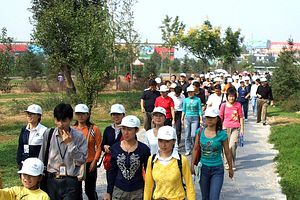As populist opposition to immigration sweeps across the West, Asia faces an analogous concern over the influx of Chinese.
“They wreck corals and throw their rubbish in the sea,” a Palauan taxi driver named Norman told South China Morning Post in March 2015. The following month, the Palau government cut the number of inbound flights from China by half.
This is a bridge too far for most Asian nations, although many are already in the final countdown of what British journalist Adrian Michaels has called “a demographic time bomb,” referring to an influx of migration altering the cultural make-up of Europe. Something similar could be said to be underway in Asia, as Chinese now constitute one-third of the foreigners in Japan, two-fifths of those in Mongolia and about half the foreigners in South Korea.
This wouldn’t matter, except for the notoriously awful behavior of Chinese travelers.
“Chinese ping pong champion Wang Nan says her husband was right to leave the faucet running in a Japanese hotel,” The Asahi Shimbun reported last week, “to waste water as revenge over Japan for invading China 85 years ago.”
And while this may sound like a headline by The Onion, stories like this are ten a penny.
In April, Chinese tourists appeared on Japanese TV clambering over Japan’s national symbol, the cherry tree, selfie sticks in hand. Some wondered whether Chinese-only zones would be needed to minimize the destruction.
“I could understand if it is kids,” said Dan Chen of the YouTube series Double Chen News. “No, these are actual, full-grown adults.”
The Hokkaido government issued a booklet on bad manners aimed at Chinese, then the Thai tourism board followed suit, and China’s state-run news agency Xinhua did the same. Beijing even created a list of nine sins that can earn transgressors a lifetime travel ban, but this hasn’t solved the problem.
Last month, a Chinese man visited the South Korean island of Jeju and stabbed a woman to death as she was praying in church. He later explained that she reminded him of his ex-wives. Also on Jeju last month, several Chinese tourists savagely beat a woman after she told them they couldn’t bring alcohol into her restaurant. When she told them they had to pay their bill before leaving, they beat her so severely she suffered a brain hemorrhage. They beat her son unconscious, too, when he tried to step in, and attacked anyone else who tried to help.
“Since a Chinese person murdered someone in Jeju Cathedral,” the JoongAng Ilbo reported a 32-year-old woman as saying, “seeing robust Chinese men frightens me.”
The article also reported that according to local police, about 95 percent of petty crimes on Jeju are committed by Chinese.
One explanation I’ve heard is that this is the result of poor development or education, but even China’s wealthiest and best educated are guilty of such behavior. I’ve also heard people say altruism has never really been a part of the culture, as exemplified by the ancient Chinese proverb, “sweep the snow from your own door; don’t look after the frost on other people’s roofs.”
But the more I look at it, the more I’m convinced it’s a largely manufactured phenomenon.
One of the first pieces I wrote for The Diplomat examined the media attention given to Chinese tourists behaving badly, in which I argued that just as the term “ugly American” has fallen from use, we may expect reports of “ugly Chinese” to fade, especially as China sees more socioeconomic development.
But the difference is, America went through a postwar period of reflection during which many of its greatest thinkers challenged the sense of entitlement that licensed the braggadocio of so many ugly Americans. People like Elie Wiesel, Martin Luther King, Jr., Cesar Chavez, Bell Hooks, Harvey Milk, Sylvia Rae Rivera, Mona Eltahawy, and Noam Chomsky criticized central aspects of American society and its government, and have been celebrated for doing so. Indeed, they’ve helped shape the national narrative surrounding a number of issues, and have made America better for it.
But the heartbreaking fact of the matter is, such people are jailed or killed in China, their insights deleted, the national narrative kept shallow and self-centered. While the government meticulously maintains the world’s largest echo chamber, it fuels an intense brand of nationalism and a hostility to foreign influence. The result? Chinese exceptionalism and a sense of entitlement that breeds insufferably bad behavior.
Nevertheless, for rapidly aging societies like South Korea and Japan, China can be a fountain of youth, as Mexico is for the United States. Criminal and indecent behavior should be policed, but anyone familiar with New York’s Flushing, Yeonnam-dong in Seoul or Tokyo’s Kita-Ikebukuro can tell you that only Chinese tourists are a concern. It’s the socialization that’s the problem. Chinese residents not only enrich and enliven cities, but the societies in which they live.

































